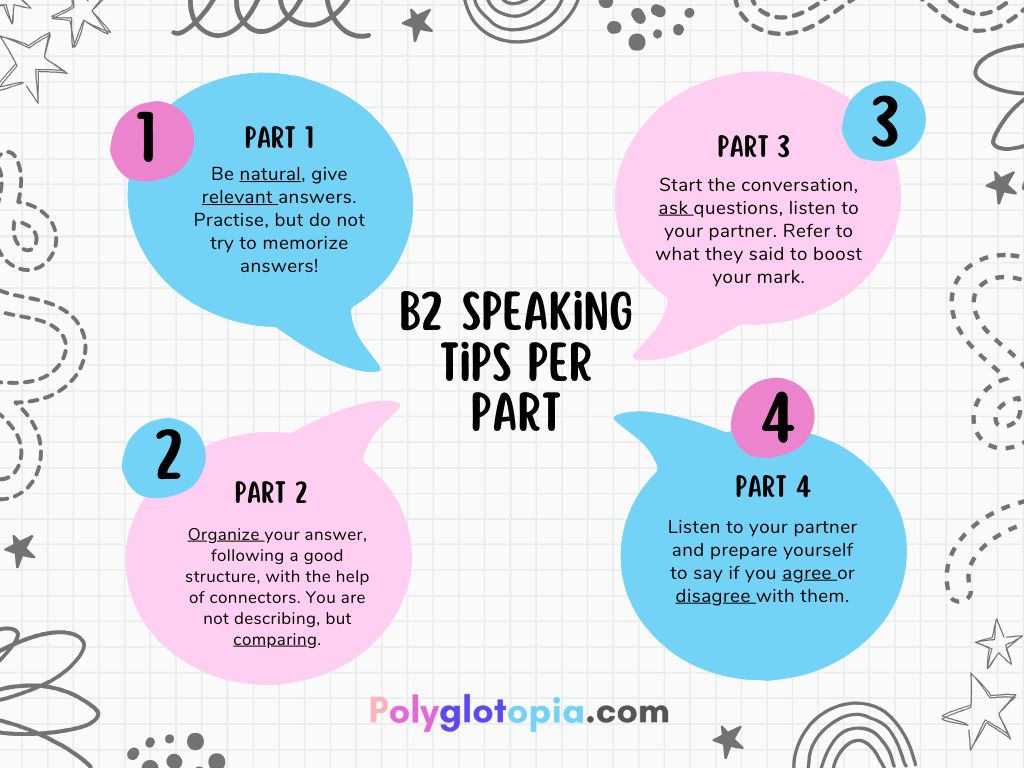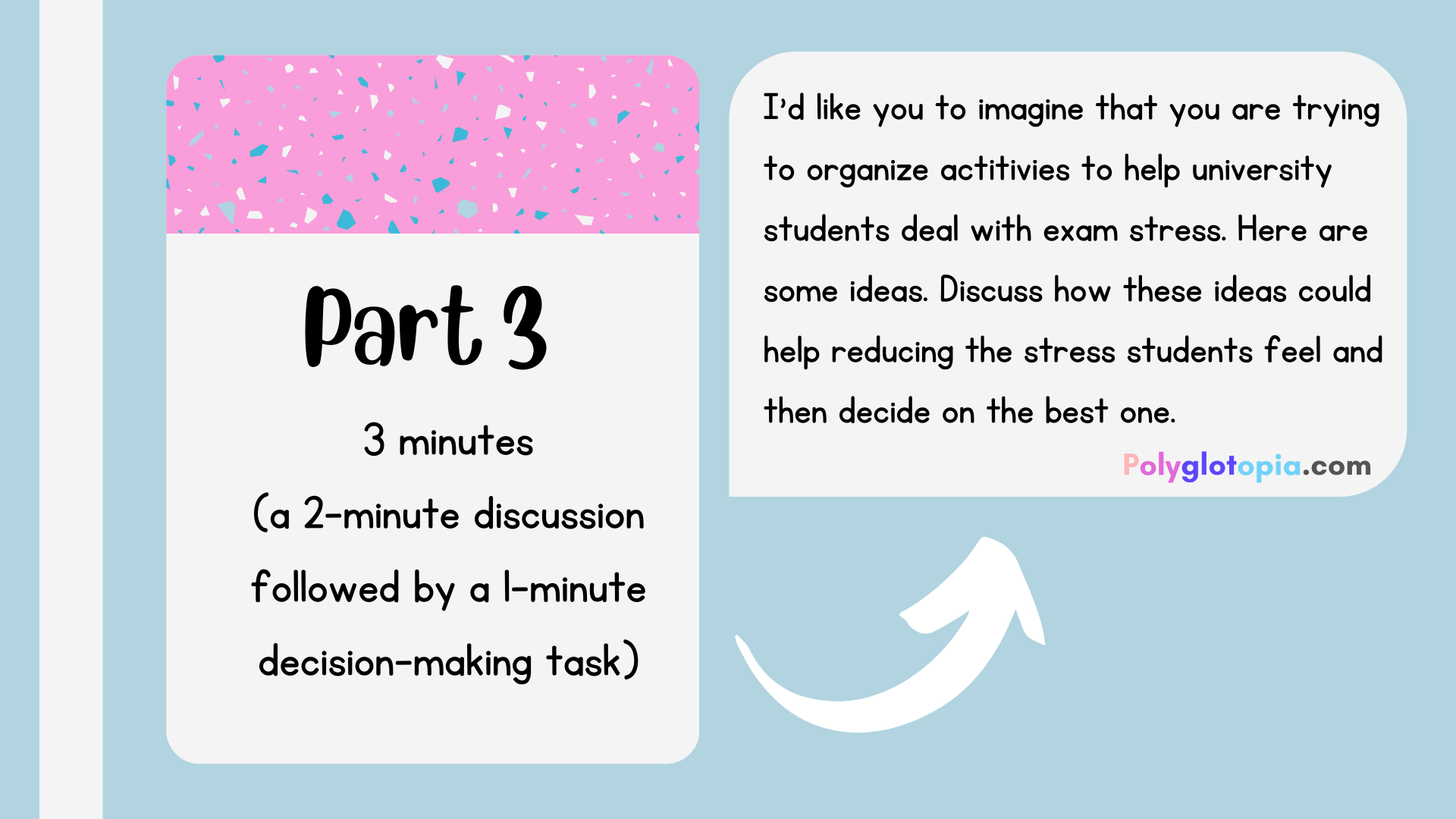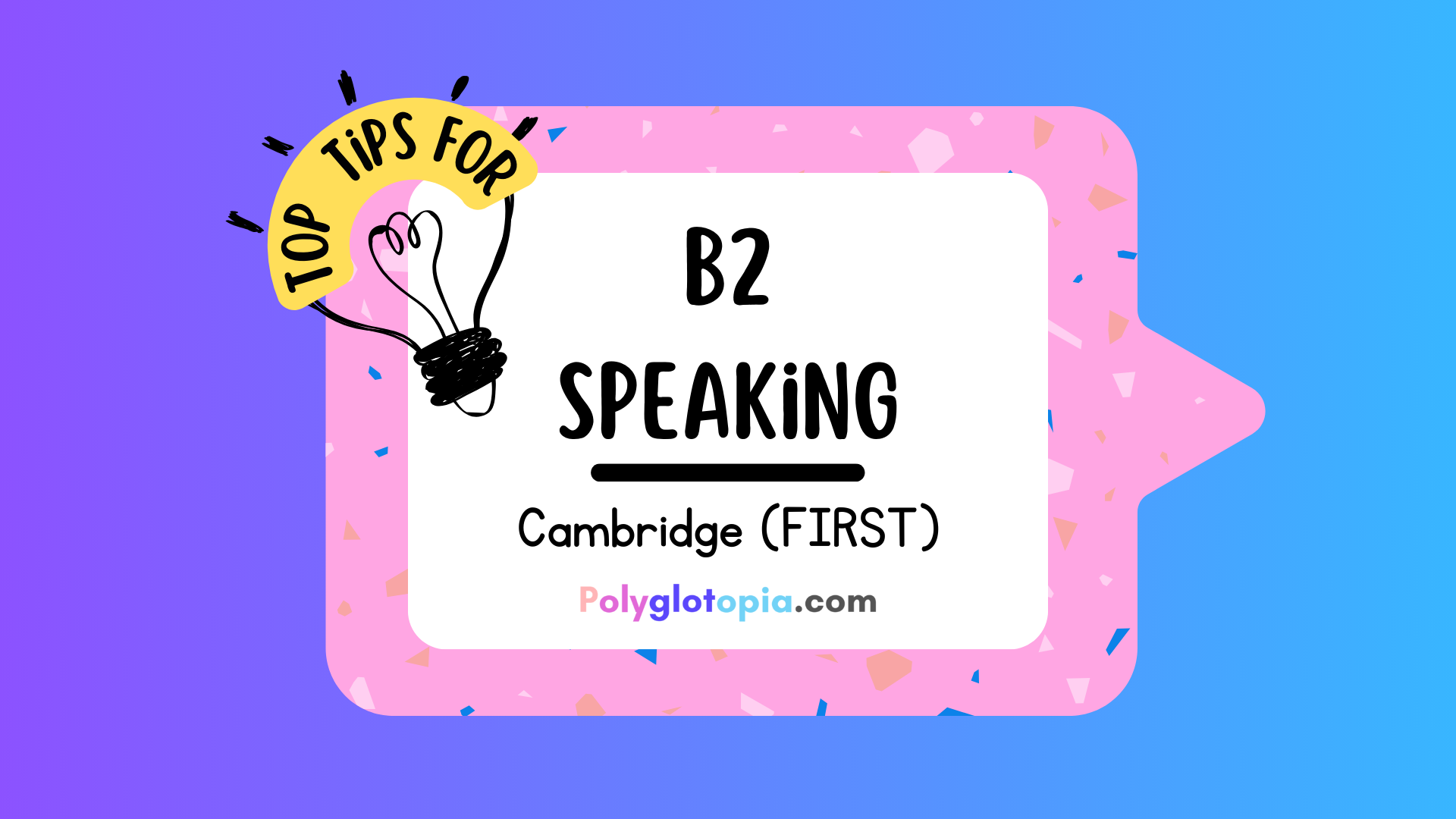Are you taking the B2 Cambridge (FIRST) exam? Then you might be looking for some tips to get a good score in the B2 speaking paper. In this article, you can find general tips about the speaking exam, based on the assessment criteria and also some tips divided by part.
Cambridge B2 Speaking Exam Structure and Tips per part

Below you can also find some tips that are specific to each part of the exam.
Part 1: In this part, you are going to answer some questions about yourself. Our tip is to be as natural as possible, and provide relevant answers. You can prepare and practise answering the exam questions, but avoid memorizing the answers. The examiners can understand you are trying to remember the answer and can take away points for that. Give relevant answers and don’t expand it with irrelevant ideas just in order to talk more.
Part 2: In this part you have to compare two pictures and answer a related question. You have to talk for a minute. After that, you need to listen to the other candidate and answer a question related to their pictures (20-30 secs). How to practise? Well, try to record yourself for a minute comparing the pictures and answering the questions. Then you can hear it and check what you need to improve. Organize your answer, following a good structure, with the help of connectors. Remember you are not describing but comparing.
Part 3: This is your time to showcase your communicative skills. You are going to discuss with your partner about a given question and several given options. Start the conversation, ask questions, listen to your partner. Refer to what they said to boost your mark.
i.e. As Maria said/mentioned…
Part 4: In this part, the examiner is going to ask you for your opinion on topics related to Part 3. At some point, you might also be asked to discuss with the other candidate. Listen to your partner and prepare yourself to say if you agree or disagree with them.
For parts 3 and 4 you can find a sample exam task on the topic of work by clicking here.
How candidates are marked
The assessment criteria are available online for free, so don’t you take a look and understand what the examiner is going to pay attention to? This way, you will know what you have to improve in order to get the desired level and pass your B2 speaking exams with a good score.
The Cambridge assessment criteria are made for the examiner to know how to mark you as well as your teachers in order for them to be able to evaluate your level. So, in case you get confused as to what they mean, so we are offering a guide with examples to help you.

Many people think that getting a good mark is all about not making mistakes. This is not exactly the case. You can make some mistakes and still pass, make none and fail. Let’s have a look at how you are marked. There are four different criteria:
- Grammar and Vocabulary: Do you use simple, but also more complex Vocabulary and Grammar? Do you use a variety of Grammar and Vocabulary structures?
- Discourse Management: Are your answers relevant? Do you speak without a lot of hesitation? Do you organize your answers well? (i.e. using linkers)
- Pronunciation: Can the examiner understand you? Is your intonation appropriate? Do you stress the correct words and syllables?
- Interactive Communication: Can you initiate and maintain the conversation (asking questions, developing, contributing with your answers)? Do you pay attention to your partner and refer to what they said? Can you negotiate and make decisions together with your partner?
In the next section, you can find useful tips, to get a better score in each criteria section.
Tips for a high score in each of the marking criteria

#Tip 1: Know the criteria
Know the criteria: As mentioned in the previous section, knowing how you will be assessed is key to scoring a good mark in B2 FIRST or FIRST for Schools Oral exam. The rest of the tips make specific reference on each of the assessement criteria.
#Tip 2: Show your knowledge
Show your knowledge: If you want a high score for grammar and vocabulary, remember to show your knowledge! You need to use some complex grammar structures (such as the passive voice, modal verbs) as well as a wide range of vocabulary (this means that you should use a variety of different words).
#Tip 3: Use connectors and gap fillers
Use connectors and gap fillers: If you want to get 5 marks for discourse management, you should use connectors and avoid hesitating too much. Using gap fillers can help you with this. Expressions such as:
-Well,…
-Let me think,…
-I’ve never actually thought about this but…
-Hmm, interesting question…
-Hmm, that’s difficult to answer…
#Tip 4: Give relevant asnwers
Give relevant answers. This is another way to get a better score for discourse management. It means that you should answer the question and you should not extend a lot with information that is not related to the question.
For example, imagine they ask you what you like to do in your free time. Here you can find three answers:
- I like watching series.
- Well, I just love watching series! I watch an episode per day. Apart from that, I enjoy going for walks near the sea to unwind and do some exercise.
- Well, I love watching series. I have a huge TV screen in the living room and I like it because it was a birthday gift and has a good resolution. It’s one of the best presents I ever got.
What is the best answer?
Number 1 is grammatically correct but maybe a bit too short. Number 3 is irrelevant as the part of the TV screen is not really related to the question. Number 2 is the best answer as it answers the question completely and uses linking words (also some interesting vocabulary).
#Tip 5: Check out the pronunciation
Check out the pronunciation: Make sure to check out the pronunciation of the new words you learn. That is because, in English, words are not written as they are pronounced.
Bonus comment: Don’t confuse pronunciation with accent! Everyone has a different accent so a good or natural accent doesn’t exist! But you need to make sure you have a clear pronunciation (what we call an intelligible pronunciation), a pronunciation that helps your interlocutor understand what you are saying. Remember: our goal is to communicate!
#Tip 6: Listen, comment, ask
Listen, comment, ask. It is important to listen to what your partner says so as to comment on it or refer to it. Example: “As Xin Yi said,…”. You can also ask questions, try to be helpful and make sure you try to initiate conversation, listen and expand on what your partner mentions. This can help you communicate in general, but also earn you some points for interactive communication.
#Tip 7: Act natural
Act natural: it is normal to be a bit stressed but try to be natural and feel confident. As long as you have practiced a lot, you have nothing to be afraid of.
#Pro tip: Do a mock exam!
Pro tip: Do a mock exam! You can train before the actual exam with your teacher and classmates, in exam-like conditions. This way, you can get some feedback and personalized tips on how to get a better score.
Useful expressions
Below you can find a list of useful phrases for your B2 Speaking exam, organized by part and function. If you want to print it out, there is also a free PDF you can download by clicking here.
Useful phrases for Cambridge Speaking: Parts 1 and 2
Part 1
Talking about likes/dislikes
I’m keen on…
I’m interested in…
I enjoy/love…
I can’t stand…
I’m not a big fan of…
Talking about routines
I often/usually/sometimes/rarely/never…
I… once/twice/three times a week…
I spend my mornings/afternoons/evenings…
Talking about preferences
I prefer (+verb+ing)
I’d rather (+bare infinitive)
Part 2
Differences and similarities
Both pictures show…
The main similarity is…
In the first picture… while/whereas
in the second picture ….
Another important difference is…
On the one hand,…
On the other hand,…
Answering the question
Regarding the question,…
When it comes to the question,…
Speculating
He/She/It/They look(s)/seem(s)…
He/She/It/They could/might be…
Useful phrases for Cambridge Speaking: Parts 3 and 4
Parts 3 and 4
Initiating the discussion:
Shall I start…?
Shall we start with…?
Asking questions and moving to the next option
What do you think about…?
What is your opinion on…?
What are your thoughts on…?
Would you agree that…?
When it comes to (n/gerund), …
As far as (n/gerund), is concerned…
Now, regarding (n/gerund),
Agreeing
Indeed.
Sure, and also…
Yeah, that’s a good point.
That’s right!
I couldn’t agree more.
I agree with you.
Disagreeing politely
I see your point, but don’t you think that…?
Well, to be honest, I don’t think so.
I see what you mean. However,…
I’m not so sure about that. You see…
I’m afraid I don’t agree with you.
Giving your opinion
For me,…
The way I see it,…
I believe that…
In my opinion,…
From my point of view,…
As far as I’m concerned…
Asking for repetition
Could you repeat that, please?
Gap fillers
-Well,…
-Let me think,…
-I’ve never actually thought about this but…
-Hmm, interesting question…
-Hmm, that’s difficult to answer…

Frequently asked questions
What if I speak for more than 1 minute in Part 2?
Whenever we exceed the time limit, the examiner will say “Thank you” and stop you. Don’t worry at all about that. Just make sure you have compared the pictures and answered the question.
What if we don’t reach a decision in Part 3?
Remember that you are tested on your English level and not your decision-making skills, so that shouldn’t affect your score.
What if my partner doesn’t contribute to the conversation?
Try to do your best and ask them questions. Don’t act the same as them, and try to show the examiner your level. Even if your partner doesn’t contribute a lot to the conversation, this won’t affect your score, you are marked separately.
What if my partner doesn’t stop talking?
If your partner doesn’t let you talk, you could politely interrupt them to make sure you talk enough to be able to show the examiner your level.
Sample Task
Time to practise! Use our presentation to practise for your exam. You can record yourself, listen later, and even evaluate your performance using the assessment criteria. The presentation is also available in pdf form in case you want to download it and save it to your computer. Good luck!









Conclusion
This concludes the list of B2 speaking exam tips. We have given you tips per part as well as tips for each of the assessment criteria combined with useful expressions. Finally, we have provided answers to some frequently asked questions, as well as a sample task that you can use as a practice test. Remember to keep in mind one of the tips each time and take little steps to make sure you make progress with the time. Let us know if you have any more questions, we are here to help!



